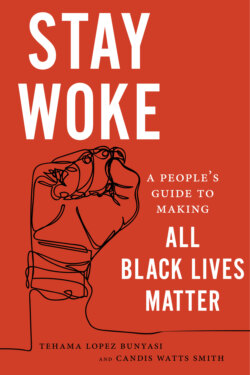Читать книгу Stay Woke - Candis Watts Smith - Страница 17
На сайте Литреса книга снята с продажи.
When Black Lives Matter
ОглавлениеJames Baldwin wrote in a letter to Angela Davis, who was two decades his junior and imprisoned on false charges of murder, kidnapping, and criminal conspiracy,
The enormous revolution in Black consciousness which has occurred in your generation, my dear sister, means the beginning or the end of America. Some of us, white and Black, know how great a price has already been paid to bring into existence a new consciousness, a new people, an unprecedented nation. If we know, and do nothing, we are worse than the murderers hired in our name. If we know, then we must fight for your life as though it were our own—which it is—and render impassable with our bodies the corridor to the gas chamber. For, if they take you in the morning, they will be coming for us that night.73
What’s past is prologue, they say. Today, young Black people have again taken the United States to task, forcing it to face its greatest flaws, many of which are rooted in anti-Black racism. One of these problems is that many Americans have yet to come to the realization that though most of us value rugged individualism, this country thrives because it is upheld by the threads that weave together many interrelated—though segregated—communities. If we don’t solve the problems that one community is facing, all Americans and the United States itself will suffer. If we do not protect the most vulnerable, we can be assured that we will find ourselves in that same undesirable position soon enough.
We see this dynamic playing out right now. For example, the War on Drugs served to punish people not only for the sale of drugs but also for drug use and addiction. When drugs such as crack cocaine ran rampant in highly segregated, poor, Black neighborhoods, African Americans bore the brunt of these policies, best evinced by the disproportionate number of Blacks who are incarcerated in the United States. As work disappeared from urban areas, Black unemployment rates skyrocketed, and all of the problems associated with highly unemployed areas developed: increased pessimism, drug use, homelessness, and crime. Behaviors that are stereotypically associated with poor Black people are neither unique to that group nor pathological. Instead, they are well predicted by structural factors, including the shape of the economy and the way that policy makers react to those who are most in need. Suffice it to say, policy makers tend to react negatively and with punitive policies to groups they see as undeserving.74
As a result of the Great Recession, many of these issues peaked again: unemployment, pessimism, drug use, homelessness. But this time, whites were affected as well, especially in the rural United States and in places where good-paying factory jobs left town. If we penalize whites who face similar challenges to what Blacks historically have in the same way, we will have an even bigger set of societal problems than we already do. What if whites were incarcerated at the same rate as Blacks? All things being equal (which they are not), then one in three white men would then have dealings with the criminal justice system. Let that sink in. US policy makers could have already prepared thoughtful, helpful, effective, cost-saving public policies to deal with the issues now faced by an even greater proportion of Americans decades ago when Blacks were the test case, for lack of better words.
Another thing: remember when we mentioned that if the gap between Black and white mortality closed, eighty-four thousand deaths could have been prevented? The assumption behind this projection is that Blacks’ rate of mortality inches closer to whites’, but what we’re actually seeing is that whites’, especially poor whites’, well-being is declining. A lot of the reason why the United States does not have a better health care system and stronger safety-net policies is because of anti-Black racism—plainly and simply. The legal scholar Ian Haney López tracks the strategic use of anti-Black racism by white, conservative politicians across several decades and reveals a pattern of behavior; by suggesting, or even hinting, that “undeserving” Blacks are likely to benefit from a social policy, politicians are able to convince (poor) whites that we should constrain that policy.75 Remember that fire we talked about? It’s becoming clear that it is already starting to spread.
The thing about the contemporary Movement for Black Lives is that it provides an imaginative vision of society based on human flourishing. Such a realization requires not just a tweaking of the existing political, social, and economic systems but a major transformation of the way US society works. What would it take to accomplish this? Stay Woke provides a set of tools for its readers to begin to unpack the ways that anti-Black racism prevents the United States from living up to its fullest potential, and it guides them to envision what each of us can do to work toward a more vibrant and egalitarian society.
—
